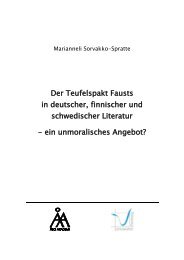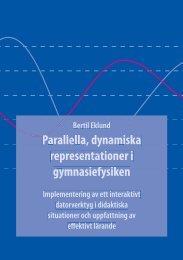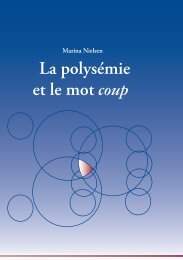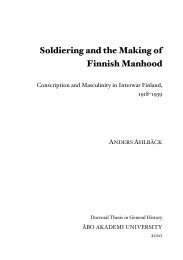Das Universale Recht bei Johannes Calvin - Doria
Das Universale Recht bei Johannes Calvin - Doria
Das Universale Recht bei Johannes Calvin - Doria
Sie wollen auch ein ePaper? Erhöhen Sie die Reichweite Ihrer Titel.
YUMPU macht aus Druck-PDFs automatisch weboptimierte ePaper, die Google liebt.
152des Gerichts Gottes, 64 welches eine Beziehung zum Gewissen bildet, denn,wie schon festgestellt, entspricht das Gewissen dem Gericht Gottes imMenschen. 65Die goldene Regel wird im Denken <strong>Calvin</strong>s mit dem universalen <strong>Recht</strong>auch dadurch verbunden, dass sie laut ihm im Herzen geschrieben ist. Sieist allen Menschen erkennbar, und Christus hat sie so formuliert, wie sieim Evangelium steht. In dieser Kommentarstelle ist auch zu bemerken,dass <strong>Calvin</strong> die goldene Regel nicht allein gelten lässt, sondern sie alsFormulierung der Billigkeitsregel darstellt: Summa haec sit, modocordibus nostris insculpa sit, quam Christus Matth. 7, 12 praescribit,aequitatis regula. 66 <strong>Das</strong> zeigt, dass die goldene Regel für <strong>Calvin</strong> eineChristian, enlightened and transformed by the Spirit of God, rightly understands the naturallaw. It is Matt. 7:12 that summarizes the content of this law as it relates to our call to dealwith our neighbour in love.” 49: “In his commentary to this verse [Matt. 7:12] <strong>Calvin</strong> definesaequitas by the content of the Golden Rule. He states that here ‘Christ is setting His disciplesa rule of fair-dealing [aequitatem], and is giving a short and simple definition of it.’ TheGolden Rule is ‘the rule of fairness [aequitatis regulam]’ which shines in the hearts of allpeople.” 50: “<strong>Calvin</strong> states that the Golden Rule sums up the Law and the Prophets becauseall that is taught there on charity (de caritate), and al the laws and exhortations found there topromote righteousness, must be related to this rule.” 71: “The significant point here is that<strong>Calvin</strong> considers equity to be the basic principle of natural law. Natural law, properlyunderstood, is equivalent to aequitas, is embodied in Matt. 7:12, and is summarized in theSecond Table of the law. <strong>Calvin</strong> frequently uses the term ‘natural equity’ to express therelation between equity and natural law. ... Equity is viewed by <strong>Calvin</strong> as having its basis,origin, and content in natural law. It is an interpretive, not a corrective principle of law.” 81:“Love of neighbour as the fulfillment of the Second Table of the Law is where <strong>Calvin</strong> makesuse of the concept of equity. In equating equity with the Golden Rule of Matt. 7:12, he givesequity a central role in providing a unifying understanding of the moral teachings ofScripture.” 82: “As we have seen, <strong>Calvin</strong> clearly states that the Golden Rule of love of Matt.7:12 is a short and simple definition of the rule of fair-dealing (aequitatem) which Christ givesto His disciples.”— Der Kirchenvater Laktanz sieht in der Befolgung der goldenen Regel denGrund für jede zwischenmenschliche Billigkeit und Gerechtigkeit. Raunio 1993, 63.64 “Ita se quisque ad Dei tribunal sistat, nec proximo suo faciat quod sibi fieri nollet:unde certa et quae nunquam fallet definitio sumi poterit.” CmEx 22:24 CO 24, 683 — Vgl.Raunio 1993, 12 über Luther.65 Vgl. Raunio 1993 über die goldenen Regel <strong>bei</strong> Luther: In der Galatervorlesung vom1519 verbindet Luther die goldene Regel mit dem zweiten Teil des Doppelgebots der Liebe(57); <strong>bei</strong> dem frühen Luther führt sie zu guten Werken (127–128); Luther sieht in dergoldenen Regel sowohl die Lehre der Heiligen Schrift als auch die Lehre der Natur (129).66 CmPs 15,5 CO 31, 148
















